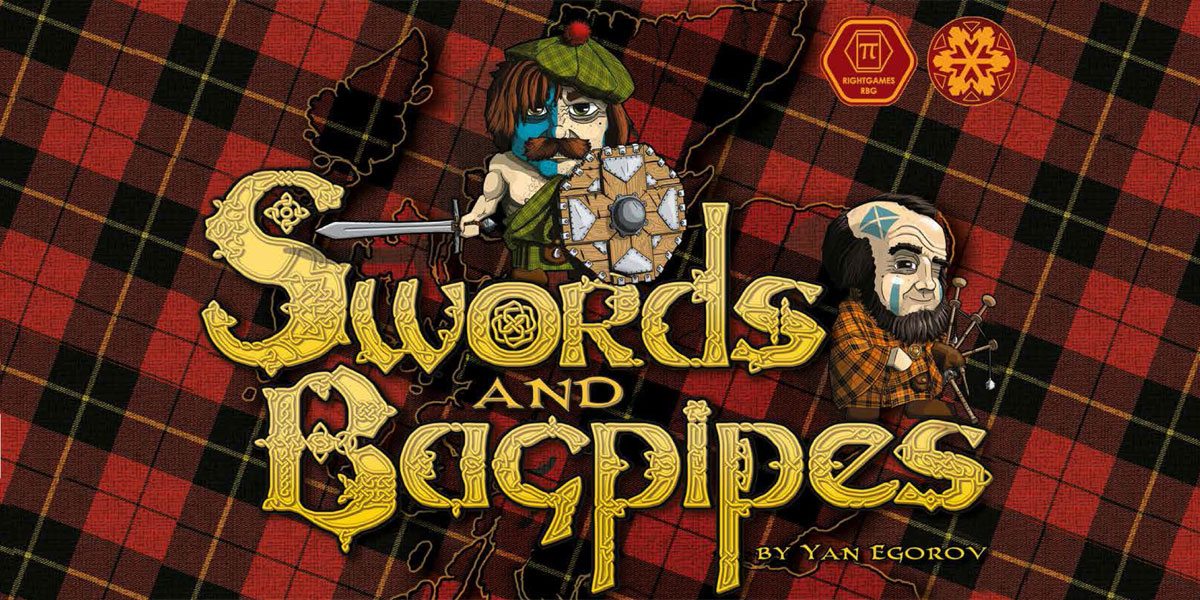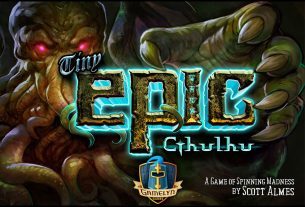 Freeeedom! As someone with a background in Scottish medieval history, Swords and Bagpipes seemed like a game meant for me. Yan Egorov has made a great, fun game where you and your friends take on the role of Scottish lords trying to gain independence from England using might, strategy, and treachery.
Freeeedom! As someone with a background in Scottish medieval history, Swords and Bagpipes seemed like a game meant for me. Yan Egorov has made a great, fun game where you and your friends take on the role of Scottish lords trying to gain independence from England using might, strategy, and treachery.
New to Kickstarter? Check out our crowdfunding primer.
Swords and Bagpipes is a tabletop game for two to six players that is a fun and novel twist on a game that is both cooperative and competitive. It just launched on Kickstarter and has already met its funding goal and unlocked its first stretch goal. Additional stretch goals will unlock even more game components and mechanics that I did not get to try. Also note that the game components in my photos are from a prototype and do not represent final quality.
At a very high level, Swords and Bagpipes sounds pretty simple. You and the other Scottish lords get seven battles (turns) to defeat the English. If Scotland survives until the end, everyone wins, but the lord with the most gold is the ultimate winner. If Scotland suffers four defeats, the game is over and everyone loses, but the lord with the fewest dagger cards is the winner of the losers. Yes, the victory conditions change based on how well you all cooperate with each other! This balance between betraying your countrymen to earn more gold and fighting for freedom is what makes this game so dynamic!
 What’s in the box (base contents):
What’s in the box (base contents):
- 1 game board
- 1 rule book
- 6 Camp sheets
- 6 Castle sheets
- 8 English Arms cards
- 2 Kind Edward cards
- 22 Bagpipe cards
- 54 unit tokens
- 60 gold coins
- 6 pairs of choice tokens
- 1 Stay Home! token
- 1 Scotland’s Defeat marker
Game setup is really quick and simple. Place the Scotland’s Defeat marker at Glasgow to track Scotland’s losses. Create the English Arms deck by combining six random English Arms cards on top of one randomly selected King Edward card. These are the scenarios for each of the seven rounds. Each player receives a clan Castle and clan Camp sheet along with a pair of matching choice tokens. Each player starts with three units and three gold in their castle along with one Bagpipe card.
Each turn is made up of seven phases: Invasion, Actions, Badge of Honour, Choice, Battle, Awards, and End. This sounds like a lot of things to do but after the first round and learning all the options, the seven phases go pretty quickly.
The Invasion phase is when the English Arms card is flipped and the scenario for the round is set. Each scenario indicates four things–how many army units the English start with, the reward for Scotland supporters if Scotland wins the battle, the reward for Scotland supporters if Scotland loses the battle, and the reward for those who betray Scotland and side with England. Those who side with England will receive their reward regardless of battle outcome to represent that this was a payment for betrayal that the crown already paid to the lord.
During the Actions phase, each player can do any or all of the three available actions in any order. Relocation allows a player to move units from their Castle to their Camp. Only units in the Camp take part in the Battle phase. Playing Bagpipe cards allows a player to play as many Bagpipe cards with the axe symbol as they want. Replenishment allows a player to do one of four things–Collect Taxes to add a gold coin to their castle, Raise Militia to add one unit to every player’s camp including Scotland’s, Assemble Troops to add two units to your own Castle, or Hire Mercenaries to spend one gold to add four units to your Castle.
During the Badge of Honour phase, the player holding the Badge of Honour passes it to any player of his choice except for the person who previously passed it to him. Whoever holds the Badge of Honour during the Choice Phase cannot side with England.
The Choice Phase is where each player secretly chooses one of their choice tokens–for Scotland or for England–and places it face down before them. Any Bagpipe cards with the choice symbol can be played during this phase as well.
The Battle Phase begins with all players revealing their choice token. The strength of the Scottish Army is equal to the sum of the units in Scotland’s camp plus all of those in camps of players who sided with Scotland. The strength of the English Army is equal to the sum of the units on the English Arms card plus all of those in camps of players who sided with England. The higher number wins. In the event of a tie, Scotland gets the win since they are the underdog! If Scotland loses, the Scotland’s Defeat Marker moves to the next space on the board.
During the Awards phase, any players who had no units in their camp will receive no reward regardless of which side they choose, and they cannot play any Bagpipe cards. All other players are given their rewards–units, gold, Bagpipe cards, and Dagger cards–based on the English Arms scenario card. Any players who fought in the battle can play any Bagpipe cards with the Awards symbol on it.
The End phase just resets everything for the next round. Discard all units in Camps and in Scotland’s camp, and the person with the Badge of Honour begins the next round.
When either all seven rounds are completed or Scotland is defeated, the game ends. If Scotland was victorious, everybody wins because freedom is the best! All players count up their gold and the lord with most gold is the new leader of Scotland and is the ultimate winner. If there is a tie, then the lord with the fewest daggers wins. The exception to this is that if any lord has at least five dagger cards more than the next highest player, that lord is declared an enemy of Scotland and cannot win. Be careful how much you betray your country for riches!
If Scotland is defeated, all lords reveal their dagger cards. The lord who was the most loyal to Scotland (and has the lowest number of daggers) is the winner. If there is a tie for fewest daggers, then the player with the most gold wins. As you can see, there is a fine balancing act between getting gold, being loyal, and being traitorous.
 We play-tested the game twice during our GeekDad Father’s Day event, and we all had a blast with this game. We were playing the three-player variant which is essentially the same but without using the Badge of Honour. I can’t wait to try the game out with a larger group and with the newly added two-player variant.
We play-tested the game twice during our GeekDad Father’s Day event, and we all had a blast with this game. We were playing the three-player variant which is essentially the same but without using the Badge of Honour. I can’t wait to try the game out with a larger group and with the newly added two-player variant.
[Editor’s Note: I got to try Swords and Bagpipes with Will at our GeekDad’s gaming event, and I think it’s a fascinating game. The core mechanic is based on the Prisoner’s Dilemma–you get the best outcome if you’re the only one who sides with England, but if everyone sides with England then you’ll probably lose. It’s definitely one I’d like to play some more, and learning a little about Scottish history is just a bonus. –Jonathan Liu]
While I wait patiently for the game to be backed and shipped, Yan Egorov was great enough to let me ask him some questions about the game and being a game maker.
GeekDad: I have a degree in History and specialized in medieval Scotland, so when I heard about your game, I was immediately hooked! How did you decide to make a game set during the Scottish Independence Wars?
Yan Egorov: Honestly, it was all because of the Braveheart movie. I was fooling around with a mechanic at that time and was choosing a setting. After a fair amount of thinking, I decided to go a simpler way and make a game about military politics. The Scottish Independence Wars are clearly the best pick not because of the war itself, but because of the country. A lot of people in Russia love Scotland!
GD: Since a lot of our readers are parents, what do you think is the right age range for Swords and Bagpipes?
YE: Well, the theme of the Wars is suitable for all ages. There is no blood and gore in the game. Everybody is nice and cute. But younger kids can’t really get the concept of the in-game betrayal. If your child is ok with that and can understand Settlers of Catan level rules, than he/she can surely play Swords and Bagpipes. I suppose the age rating is about 10+.
GD: When and how did you first get into gaming?
YE: At the University. I hung out with the bunch of geeks. Most of the time we played really hardcore stuff like D&D and Twilight Imperium. Now we are too old for that and play much “softer” boardgames.
GD: A lot of us gaming geeks dream of creating our own games. I know I have several ideas bouncing around in my head at any given moment that I’d love to see in the real world. How did you get into creating games and do you have any tips on where people can get started?
YE: Well, I started because of a game design contest with a $1,000 prize. I advise people to find some kind of boardgame-design community in their hometowns. You don’t need Knizia-famous people. All creators are going through the same stages. There are a lot of simple truths that you can get from authors of one or two published boardgames.
GD: Do you make games full-time or do you have another job as well?
YE: I work in the game-dev industry, PC and mobile, so my hobby and my job are kind of related.
GD: Something along the lines of “Being a geek isn’t about what you love but how you love it,” is sort of the new geek mantra. Do you have anything, besides gaming, that you consider yourself a geek about?
 YE: I’m a re-enactor. I think that’s a rather geeky way of spending your free time. I don’t possess the perfect knowledge of history, but I am one of the top dance re-enactors in Russia. And my weapon fighting skills are all right too.
YE: I’m a re-enactor. I think that’s a rather geeky way of spending your free time. I don’t possess the perfect knowledge of history, but I am one of the top dance re-enactors in Russia. And my weapon fighting skills are all right too.
GD: This is probably a bit premature since you’re right in the thick of it with Swords and Bagpipes but do you have any other game ideas or Kickstarter projects in the works you can talk about?
YE: Of course! Good ideas are in the air. But it’s unlikely that I will get to anything else until I publish Swords and Bagpipes.
For more details on the game, the campaign and some gameplay videos, head over to Kickstarter! You won’t regret grabbing a copy of this game.



